Editorial: The Hidden Paradise
"Now was I brought up through the flaming sword into the paradise of God. All things were new; and and all the creation gave unto me another smell than before, beyond what words can utter." -George Fox, Journal
“. . . [A]s people come into subjection to the Spirit of God . . . they may . . . receive the . . . wisdom that opens all things, and come to know the hidden unity in the Eternal Being.” -- Ibid
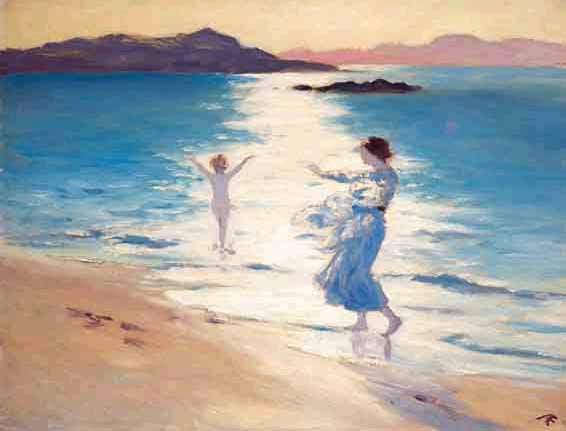
The central Quaker conviction is the presence in everyone of the Inner Light. What if it were also called the Inner Love?
The Hidden Unity
The reality behind the term, the That which links us to God, is well understood to be the ground of our commitment to Peace, to Nonviolence. It is also the foundation of our relationship to nature, particularly to animals, and in this regard "Light," insofar as it tends to be associated with guidance, may not be helpful. Two of the reasons why Friends have privileged the term "Light" are its prominence in the Fourth Gospel and other Johanine writings, and the teachings and visionary experiences of George Fox. This is especially true in the crucial "ocean of light" vision during his period of spiritual awakening: "I saw . . . an ocean of darkness and death, but an infinite ocean of light and love, which flowed over the ocean of darkness; and in that I saw the infinite love of God." Love is not only equally emphasized in this account of Fox's, but is equally (or even more) prominent in the Johanine writings than light. Infinite Love is the divine Presence manifesting as the magnetic drawing together of the separated and alienated, the Hidden Unity. Elsewhere, Fox says "[M]ind that which is eternal, which gathers your hearts together up to the Lord, and lets you see that you are written in one another’s hearts. . .” As we come closer to realizing the divine Presence within, we come closer to all the universe, permeated as it is with that same Presence.
As the Inner Love or Hidden Unity is more and more fully manifested, violence and exploitation are ruled out; harmony prevails, not only in human society but among living beings and the rest of nature. This state might be called “the Hidden Paradise." The term Paradise (originally Persian) is usually understood as a state of past and future. It is identified with the Edenic garden at the beginning of the biblical saga of history, and anticipated as returning in the Messianic Age, or the Peaceable Kingdom in which the wolf and the lamb will lie down together. But there are good reasons to hold that, despite the world's enormous evil--ignorance, alienation, violence, and pain--Paradise is a present reality. George Fox certainly found it so, according to his vision in the first epigraph above.
The concept of a power drawing together all the separated is a major theme of German Romanticism, significantly expressed in Frederich Schiller's 1785 poem "An den Freude," "Ode to Joy." The Divine Light is suggested in its imagery of fire: Joy is addressed as the "spark of the divine," the "daughter of Elysium."
Wir betreten feuertrunken,
Himmlische, dein Heiligtum.
Deine Zauber binden wieder
Was der Mode Schwert geteilt
Bettler werden Fuerstenbrueder
Wo dein sanfter Fluegel weilt.
Seid umschlungen, Millionen! . . .
Drunk with fire, now we enter
Goddess, thy most holy shrine.
Thy strong magic binds together
What Convention's swords divide;
Beggar is a prince's brother
'Neath thy downy pinions wide.
We embrace you, all ye millions! . . .
Beauty and Splendor
Another characteristic of Paradise is preternatural beauty and brightness: glowing colors, exquisite shapes, celestial music, intoxicating fragrance. The familiar and the strange are united: human beings may seem to be angels, flowers and leaves to be living jewels; mountains or trees or rivers may be indwelt by numinous beings. The whole Earth, and each thing in it, are intensely alive.
Writings of other mystics and poets support Fox’s account of experiencing Paradise as a present reality. For example, his contemporary Thomas Traherne, a devout Anglican clergyman and poet, in his book Centuries of Meditation describes a childhood in which he seemed "as one brought into the Estate of Innocence. . . . . I saw all in the peace of Eden . . . . all time was Eternity . . . . The [grain] was orient and immortal wheat. . . .The dust and stones of the street were as precious as gold . . . The green trees . . . transported and ravished me . . . almost mad with ecstasy, they were such strange and wonderful things . . . .Boys and girls tumbling in the street . . . were moving jewels . . ." Though Traherne later learned “the dirty devices of the world,” and had to unlearn them, he never fully lost his awareness of the presence of hidden splendor: “The world is a mirror of infinite beauty, yet no man sees it.”
Presence
Similarly, Wordsworth’s poem "Ode: Intimations of Immortality . . . " reflects on a childhood in which "meadow, grove, and stream / To me did seem / Appareled in celestial light, / The glory and the freshness of a dream"--a splendor that as an adult he could no longer perceive, though nature still was lovely to his eyes. In "Tintern Abbey" he speaks of
a sense sublime
Of something far more deeply interfused,
Whose dwelling is the light of setting suns,
And the round ocean, . . . and the mind of man;
A motion and a spirit, that. . .
. . . rolls through all things."
The city-bred Irish poet and artist AE (George Russell, 1867-1935) also perceived a living Spirit and a preternatural brightness in nature and in otherworldly visions. Unlike Wordsworth and Traherne, he largely developed the gift as he approached adulthood. In A Candle of Vision he says that "Such a beauty begins to glow on us as we journey towards Deity, . . . I would cry out to our humanity, sinking deeper into the Iron Age, that the Golden World is all about us and that beauty is open to all . . ."
Harmony with Animals
Wordsworth thought of the "motion" and "spirit" as impersonal, while Traherne experienced this power as the Creator. But neither of these nature poets is known to have tried to realize the harmony of Eden in relations with animals; in fact, in his long poem The Prelude, Wordsworth relates how in his happy childhood he even set snares for birds. It seems that one can feel oneself to be living in a state of paradisal unity with nature, and yet engage in monstrous violence against fellow dwellers in the Garden. George Russell was rather more in tune with his fellow animals (human and otherwise); he was a vegetarian, and compassionately worked to bring about a better life for impoverished peasants, but was no abolitionist on behalf of animals.
The Evangelical poet William Cowper (1731-1800) in his long poem of 1785, The Task, does better than Wordsworth and Traherne in this regard. Not only does he perceive signs of Paradise in nature, tracing it to the Creator's Presence:
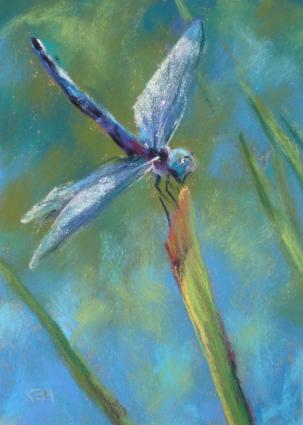 The soul that sees Him . . .
The soul that sees Him . . .
Discerns in all things what, with [stuporous] gaze
Of ignorance, till then she overlooked,
A ray of heavenly light gilding all forms
Terrestrial, in the vast and the minute
The unambiguous footsteps of the God
Who gives its lustre to an insect's wing
And wheels His throne upon the rolling worlds.
Cowper also gave emphatic expression to his kinship with animals. With prophetic fervor he excoriated hunting, the “detested sport / which owes its pleasures to another’s pain.” He created a mini-paradise of harmony for a few hares whom he befriended, feeding them by hand, and harboring them in his house from “the sanguinary yell of cruel man” and “the savage din of the swift pack” (PT issues 2, 27, and 31). Although he unfortunately saw the Bible as justifying meat-eating, it is likely that he himself chose vegetarianism, since he lived very simply, and notes that we are only “carnivorous, through sin."
The Beatrician Vision
Support of a somewhat different sort for the hidden paradise is also found in the work of Anglican theologian and literary critic Charles W. S. Williams (1886-1945). In his poems and novels, and his studies of Dante and Wordsworth, especially The Figure of Beatrice, Williams proposes that the celestial light that Wordsworth saw in nature is essentially one with the wonder that Dante saw in his Lady. "She seemed the daughter of a God." This divine Glory is what anyone who falls in love perceives in the beloved. The lover may be largely unaware of the beloved’s very real faults and sins during this temporary period of openness to the Glory; thus the commonplace saying "Love is blind."
After the vision passes, as it nearly always does in a year or two, those faults will probably be glaringly apparent, and the lover usually comes to agree with the majority opinion that what s/he saw was an illusion. But, says Williams, it is not; all along, the Glory has coexisted with the beloved's sins. Mostly unseen, it is present in everyone, just as the same celestial splendor remained in nature although Wordsworth could no longer perceive it. Williams views this temporary openness, which he calls "the Flying Moment," as a challenge to awaken spiritually: the lover, like the nature mystic, is called to enter the long, hard path of learning to love all his or her neighbors as himself. In effect, s/he is to realize, so far as possible, Edenic harmony in human society as well as in nature. Unhappily, Williams, like Wordsworth and Traherne, failed to apply this principle to love for nonhuman neighbors.
Realizing the Inner Love
Clearly, there is tension between different aspects of the Hidden Paradise. Many fall in love, and later fall out of love, without heeding, or even hearing, the call to realize the Hidden Unity. Some have felt and yearned after the divine Presence and/or the luminous beauty they perceived in nature, but never questioned the blood on their plates. And many animal activists, working to realize the kinship with animals by opposing human violence against them, have fallen to the temptation of mental or verbal violence against the abusers (a few even justifying physical violence). This stance, needless to say, does not help to realize the Inner Love.
The young Francis of Assisi dreamed of becoming a heroic knight, of attaining honor and fame by doing battle with injustice. But his two knightly expeditions fizzled dismally. He began to hear the voice of Christ, whose message was very different. As Murray Bodo points out in his essay "Francis of Assisi," the would-be knight learned that what he must fight was the darkness within himself, especially the fear that underlay it. (Perhaps Francis' greatest dread was touching a leper.) Instead of an acclaimed hero, he had to become a despised beggar. Only when he fought against and defeated his fear, the self-aggrandizing desires laced through his good will--his own potential for evil--did his mind open to the Hidden Unity, his eyes to the Hidden Paradise. Keeping his face turned to the Presence, he became a man of peace, unable to do violence to any because he realized that all beings, all creation without exception were his sisters and brothers. Only love for the (seeming) enemy can transform that enemy to the friend s/he in essence is.
--Gracia Fay Ellwood
Painting of mother and child on the beach by AE.
Painting of dragonfly by Karen Margulis.
A portion of this editorial will appear in my essay "A Quaker View: Prophets and the Hidden Paradise" to be published in Call to Compassion: Religious Reflections on Animal Advocacy. Edited by Anthony Nocella, it will be issued in 2009 by LanternBooks.
A Glimpse of the Peaceable Kingdom
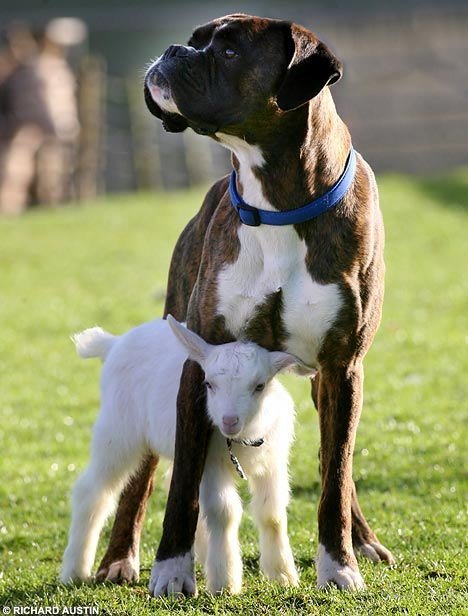 A paternal boxer dog has adopted an abandoned baby goat as his surrogate child.
A paternal boxer dog has adopted an abandoned baby goat as his surrogate child.
When only a few hours old, Lilly, the smallest of triplets, was rejected by her mother who could only care for the two stronger kids. Their caretaker, Elizabeth Tozer, began hand-feeding Lilly. The little waif was soon adopted by the compassionate Billy, who became her constant companion. According to Ms. Tozer, "Lilly follows Billy around, which is really quite amusing to watch." He sleeps with his baby, licks her clean, and protects her from any dangers that might lurk at Pennywell Farm and Wildlife Centre at Buckfastleigh, Devon, in southwest England.
The pair have attracted quite a crowd at the animal center, and the staff are keen to see how their relationship will develop.

--Contributed by Virginia Iris Holmes
--Photos by Richard Austin

NewsNotes
Factory Farms Pass the Buck
A report released last week by the Union of Concerned Scientists (UCS), titled "CAFOs Uncovered: The Untold Costs of Confined Animal Feeding Operations," exposed the negative effects that Confined Animal Feeding Operations (CAFO's) have on humans, animals and the environment. Margaret Mellon, director of UCS's Food and Environment Program said, “If CAFOs were forced to pay for the ripple effects of harm they have caused, they wouldn't be dominating the U.S. meat industry [as] they are today.” To read the full article please visit www.corporatecrimereporter.com/cafos042408.htm
--Contributed by Lorena Mucke
Feel-good Labels
Given the increasing pressure from compassionate consumers, the food industry has come up with labels in animal products that suggest a cruelty-free approach to raising farmed animals. However, "free-range", "organic", "humanely raised" and "grass fed", among others, are not quite what the consumer would like to believe. Joanna Lucas, from Peaceful Prairie Sanctuary, exposes the reality behind these labels and even shows the faces of the farmed animals who are involved in this form of production. To read the full article please visit peacefulprairie.blogspot.com/2008/05/letter-from-vegan-world.html
--Contributed by Lorena Mucke
Chicken Hero
Jennifer Rotondo, writing in the Utica Observer-Dispatch, tells how a fearless chicken-friend defended her and her boyfriend from a big attacking dog. Jennifer, who had already been cutting down on eating animal flesh, gratefully went veg. For the full story go to www.uticaod.com/archive/x194403215/Why-I-am-vegetarian
--Contributed by Steve Kaufman and Erika
Film Review: Prince Caspian
The Chronicles of Narnia: Prince Caspian. A 2008 film by Disney and
Walden Media, directed by Andrew Adamson, based on the classic book
by C. S. Lewis. Starring Liam Neeson as the voice of Aslan, Georgie
Henley as Lucy, Skandar Keynes as Edmund, Anna Popplewell as Susan,
William Moseley as Peter, Ben Barnes as Caspian, Eddie Izzard as the voice of Reepicheep, and Sergio Castellitto as Miraz.
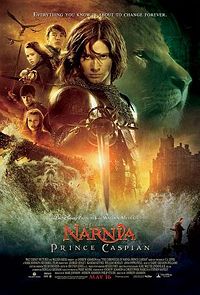 In Narnia, 1300 years have passed, but only one year in England.
In Narnia, 1300 years have passed, but only one year in England.
Narnia has been invaded and occupied by human beings, the Telmarines, whose armies have exterminated or driven into hiding the original inhabitants, mythological beings such as centaurs and dryads, as well
as talking animals. Among the latter we find mice, brave little fighters led by the swashbuckling Reepicheep, whom Narnia-lovers have waited so
long to see. His rodent guerrillas successfully ambush helmeted and
crossbow-wielding Telmarine soldiers, and capture--actually, rescue--the legitimate Telmarine king, Caspian, who is on the run from his uncle, the murderous usurper Miraz.
In a major sequence not found in the book, our heroes and their
forces seek to take Miraz's castle. During this suspenseful adventure
the mice come upon a just-waking cat. They bind and gag their foe,
though they could have as easily (perhaps more easily) just killed
him/her. In a film with too much violence, we bless and cherish the
mice for this. Indeed, close to the end of the film (in a scene
extremely faithful to the text of the novel) Aslan rewards them with
a special boon - not for their great courage but for their great love.
The heavies of this story, the Telmarines, who turn out to be
descended from people of our Earth, are played by actors and extras
of Mediterranean extraction, and wear costumes suggestive of
sixteenth-century Spaniards. Being myself of Mediterranean - mostly
Spanish - stock, I am grateful that the Telmarine people are not
demonized, but presented as only too human. In fact, the movie opens,
surprisingly, with the birth of a baby boy to the Telmarine Queen.
This has the effect of drawing the viewer's sympathies towards these
people and preventing our seeing them all as villains. The movie not
only begins with this baby, but almost ends with him, as he and his
mother are among the first four Telmarines who go through Aslan's
portal to their ancestral Earth. This hopeful closure, faithful to
the book, can't help but engage the viewer's sympathies toward the
erstwhile bad guys.
After mice and Telmarines, the centaurs are the greatest wonder.
Unlike Lewis' Nordic-looking creations, they are Negroid in
complexion and feature; like Lewis's, they are powerful and heroic. In
fact these are the best centaurs I have ever seen; the technology has
made astonishing advances. There is in particular a very young
centaur who only appears for a few seconds, but that was enough to
win my heart.
There are also gryphons, who have been among my great favorites ever
since I read Alice's Adventures in Wonderland. I rejoiced in their
beauty and strength, and cried when one of them was slain.
I also wept for the death of a bear, but not nearly as much as Lucy,
who feels the most sympathy for the beast, even though he intended to
eat her. The Pevensies are astonished and grieved to have come upon a
Narnian animal who lacks language. Apparently, in the film's
conception of Narnia, all animals were linguistically endowed to
begin with, but some have lost this gift due to their bitter response to
persecution from humans. This is, frankly, quite an improvement over
Lewis's unworkable scheme, in which Narnian creatures are arbitrarily
divided between nonspeakers, who may be hunted and eaten, and
speakers, who are respected as persons. (Some of us believe that Narnia really exists somewhere--but we are not so sure that Professor Lewis got it right in every particular!)
At any rate, Lucy is quite comforted from her sorrows when she is
reunited at last with Aslan. The unconditional love of Aslan and Lucy
for each other is the purest, and therefore the most powerful, in the
universe. With it, Death and Time are nothing.
I missed several good things from the book: the scenes of the little
Caspian being told stories of the Old Narnia by his nurse, grieving
when she is dismissed, and eventually being reunited with her; the
stargazing scene with Doctor Cornelius; Lucy's being called a hero by
Peter for not saying "I told you so" even though she certainly was
entitled to do so. I also missed the little linguistic joke (which seems more
Tolkienian than Lewisian) in which Peter, dictating his letter of
challenge to Miraz, insists that "abhominable" should be spelled with
an "H."
A far more important element is not only preserved, but extensively
developed: we see the Telmarine lords Glozelle and Sopespian long
being bullied by Miraz, and finally getting their revenge by deceitfully
manipulating the evil king to accept Peter's challenge to single
combat. And there are eucatastrophic moments that can be called
Plusquamtolkienian - more Tolkienian than Tolkien: Aslan awakening
the Trees, and later, the mighty spirit of the River. The last-named
scene is even better than in the book. The same is true for the
conjuring-up of the White Witch. In this, and elsewhere, Edmund quite redeems himself: He is now Lucy's most faithful supporter, and the Witch's most determined foe.
I intend to see this splendid film as many times as possible, and
hope it will inspire people everywhere, children in particular, to
greater appreciation of, and kindness to, lions and mice and bears.
And of course, to imitating the courage and compassion of Reepicheep and his Talking Mice.
- Review by Benjamin Urrutia
Recipes
Pizza Margherita
serves 4-6
Dough:
2 ½ tsp. dry yeast
½ tsp. evaporated cane juice
2 ½ cups organic unbleached flour
½ cup organic whole wheat flour
¾ tsp. sea salt
1 ⅓ cup spring water, warm 105° F
Topping:
1 lb. Roma (plum) tomatoes, sliced
1 T. fresh oregano, chopped
¼ cup extra virgin olive oil, plus more for drizzling
Dissolve yeast in 1/3 cup warm water with ½ tsp. evaporated cane juice. Let sit, covered with plastic, for 10 minutes until foamy.
Place the flour in a large stainless steel mixing bowl, make a well in the center and pour in the dissolved yeast. Add the remaining 1 cup water and 3 T. olive oil; mix with a wooden spoon to form a soft dough. Knead until smooth and elastic, about 12 minutes. Cover with a towel and let rise in a large bowl until doubled in volume, about 1 ½ - 2 hours.
Press and stretch dough out in a circle about 3/8 inch (1 cm ) thick on a pizza pan with your fingertips; do not use a rolling pin.
Drizzle the pizza dough with remaining olive oil, top with tomato, sprinkle with oregano. Drizzle with extra olive oil. Bake 425° F until crust is lightly browned – about 22 minutes. Sprinkle with Vegan Parmesan. Serve immediately.
Fresh tomatoes make this a wonderful summertime pizza.
-- Angela Suarez
Dandelion and Black Olive Topping for Pizza
Serves 4 or use for pizza topping
2 lbs. dandelion
2 T. extra virgin olive oil
2 cloves garlic, chopped
12 oil cured black olives, pitted and chopped
2 T. capers
Cook dandelions in 1 cup of water until tender, about 8 -10 minutes. Add sea salt to taste. Squeeze out any water. Chop medium-fine.
Over low heat, warm olive oil ; add dandelion; toss to coat with olive oil. Add olives and capers. Let flavors blend, then cool. Spread on a prepared pizza crust and bake until dough is golden. This recipe may also be used to fill a fresh focaccia for a delicious panino (sandwich).
--- Angela Suarez
Scarola con i Pistacci (Escarole with Pistachios)
serves 4 or topping for one pizza
2 lbs. escarole
¼ cup extra virgin olive oil
3 cloves garlic, chopped
sea salt, to taste
freshly ground black pepper to taste
¼ cup shelled natural color pistachio nuts
Clean and chop escarole. Heat olive oil in skillet, add garlic, cook for one minute, careful not to brown the garlic, over medium heat. Add escarole, cover and reduce heat and cook for 5 minutes. Season with salt and black pepper, scatter pistachios on top and cook for another moment or two before serving.
This is a delicious and versatile recipe for escarole. It may be used as a topping or sauce for pasta, or simply be eaten as is as a vegetable side. I love to grow escarole in my small family garden; many of the heads of escarole harvested are used to make delicious pizzas.
-- Angela Suarez
My Pilgrimage: Frat House Vegetarian
by Jason K. Redi
 During the summer of 1989, I was living in my fraternity house with a few other brothers who were also staying around the university for the summer. One particularly hot afternoon, two of us went to eat at the local cheese-steak house. Cheese-steak houses are particularly popular around the Philadelphia area and serve food which is about as grease laden and gooey as carnivores will eat. So, there we were talking over blood, grease, and anonymous cheese mush on a very hot afternoon on a summer where we had probably been up till four in the morning, drinking ourselves silly every night. We felt terrible and were not happy about it.
During the summer of 1989, I was living in my fraternity house with a few other brothers who were also staying around the university for the summer. One particularly hot afternoon, two of us went to eat at the local cheese-steak house. Cheese-steak houses are particularly popular around the Philadelphia area and serve food which is about as grease laden and gooey as carnivores will eat. So, there we were talking over blood, grease, and anonymous cheese mush on a very hot afternoon on a summer where we had probably been up till four in the morning, drinking ourselves silly every night. We felt terrible and were not happy about it.
"Ever think about being vegetarian?" one of us asked the other.
"Yeah, sure. Occasionally."
"Want to try it for a month?"
"Okay."
And that was it. The two of us had to cook for ourselves for the summer anyway (no cook at the fraternity when there were only a few guys around). Both of us were fairly liberal and educated, so vegetarianism wasn't shocking. It was just something weird to try as a short experiment (like a new beer).
After a month of eating lacto-ovo vegetarian food (though most meals wound up being vegan), we both felt healthier. We decided to keep going with it. (In retrospect, we probably would have felt [healthier] just by not drinking and by exercising a little bit--but eating vegetarian was more fun than either of those alternatives.)
During this time, I was reading an issue of Penthouse (yes, there are very good articles in there). There was an article called "Green Rage" which was written by someone from People for the Ethical Treatment of Animals (PETA). It was all about the environmental and ethical implications of eating meat. I hadn't ever thought about it before, and had never read anything quite like this article. I think my mind was open to really thinking about it all because, at the time, I wasn't eating meat and could imagine never eating meat again.
I wanted more information, so I called Penthouse and tried to get the address of the author or PETA. (Remember, this was in the days before the Internet). Due to their privacy policy, the magazine could only forward mail that I sent to it and not give out addresses directly. I wrote, but never heard back. About a year later, I found the . . . address of PETA . . . and joined so I could learn more about the ethical and environmental side of vegetarianism.
I've been vegetarian [ever since and am now vegan]. My friend who was at the steak house is still a vegetarian as well. We saw each other at a wedding a few months ago and agreed that neither of us have ever thought about going back.
From Voices From the Garden, edited by Sharon Town and Daniel Town. Used by permission of the editors.
Pioneer: Herman Daggett (1766-1832)
Herman Daggett was best known in his time as a fairly distinguished Congregational and Presbyterian minister, author, and teacher (he served at various times in both traditions), especially as founding president (1818-1824) of a Foreign Mission School in New Canaan, Connecticut. He is now most remembered, at least in animal defense circles, for an commencement address on "The Rights of Animals" he delivered at Providence College (now Brown University, Providence, RI) in 1791. He had graduated from the college in 1788, and was an M.A. candidate; the talk was published in 1792, the same year Daggett began his ministry on Long Island. Norm Phelps, in The Longest Struggle, states that after the "Massachusetts Body of Liberties" of 1641, which legally forbade cruelty to animals, Daggett's lecture is the first statement he knows of from the western side of the Atlantic to advocate kindness to animals.
"The Rights of Animals" clearly derives its title from Tom Paine's then prominent and controversial The Rights of Man, quotes extensively from the poetry of Cowper, and has allusions to Humphry Primatt's 1776 book The Duty of Mercy and the Sin of Cruelty to Brute Animals (See PT 3) . But clearly the youthful Daggett, described as a rather serious and thoughtful (though not gloomy) student and clergyman, must have pondered the subject deeply on his own to come up with so radical and unexpected a topic for a commencement address in the New World.
"The design of my appearing in public, at this time, is to say a few things in favor of a certain class of beings whose rights have seldom been advocated, either from the pulpit, from the stage, or from the press. I mean the inferior animals.
The cruelty and injustice with which this class of beings has been treated by their boasted superiors of the human race is too notorious to need a particular recital. In general, their welfare and happiness has been looked upon as a matter of very little importance in the system, and in our treatment of them, hardly to be regarded. . . .
"That they are sensible beings and capable of happiness, none can doubt: That their sensibility of corporeal pleasure and pain is less than ours, none can prove: And that there is any kind of reason why they should not be regarded with proportionable tenderness, we cannot conceive.
"But lest this mode of reasoning should be thought too [scrupulous], let us call into view a rule of judging, instituted by a divine Philanthropist and oracle of wisdom in the days of Julius (Tiberius) Caesar. "That we do to others as we would have them do unto us.. . . "
Whereas there is no such consciousness of guilt when one of the inferior animals only has been the subject of human cruelty, . . . let a person be taught from his earliest years that it is criminal to torment and unnecessarily to destroy these innocent animals, and he will feel a guilty conscience."
Daggett continues particularly to attack the wantonness of inflicting pain on animals for "sport," and like many more recent commentators suggests that callousness to animals can be but a stage in the perversions of one's psyche toward brutality toward humans. He makes the interesting observation that "There was a time (it is said) when, by the laws of England all BUTCHERS were disqualified from sitting, as jurymen, in any capital cause: Because, it was supposed that being accustomed to shed the blood, and take away the lives, of other animals, they would not have the feelings, common to the rest of mankind, about the life of a man."
Then, like some more recent animal rights theologians, Daggett ends with an eschatological perspective:
"I cannot close these observations, without indulging myself, for a moment, in the pleasing anticipation of that time, which is fast approaching, when there shall no longer be any disposition, in mankind, to hurt the peace of one another, or to wage war with innocent nature: 'For the earnest expectation of the CREATURE, waiteth for the manifestation of the Sons of God': -- the joyful period, when the groans of this lower creation shall have an end."
--Robert Ellwood
Krotona, Ojai, California
Poetry: Wood-Thrush
By John Hall Wheelock
This poem appeared in the December 2005 issue of PT, but appears again because it expresses an intuition of the Hidden Paradise--and because it never hurts to reread a fine poem. As the author narrates elsewhere, it is based on an experience of what might be called Great Memory of all the world's grief and joy (or perhaps a Life Review of all Earth's history) that came to him during the bird's brief song.
Wood-Thrush
 Behind the wild-bird's throat
Behind the wild-bird's throat
An Eden, more remote
Than Adam knew of, lies--
The primal paradise
Lost, yet forever here,
From that wild syrinx cries
Into the listening ear,
The labyrinthine heart,
A longing, a regret,
In which it has no part.
Where the young leaves are met
In overarching green
Soft winds stir and divide,
Where shadows cloud and throng
The coverts in between,
That early bud of song
Opens its petals wide,
Becomes a three-fold star
Of voices twined and blent,
Happy and innocent,
Within whose singing are
Troy lost and Hector slain,
Judas and Golgotha,
The longing and the pain,
Sorrows of old that were
And joy come back again
From ages earlier,
Before joy's course was run,
Before time's bounds were set--
The fountains of the sun
Are in that twining jet
Of song, so clear, so cool.
While the false heart raves on,
For longing, like a fool,
The quiet voice is gone:
The song, inept to save,
Happy and innocent,
Falls silent as the grave,
Closing the door upon
Those half-remembered things--
Only the silence sings
On, and forever on.
Photo by Lang Elliot
Continuity
By AE (George W. Russell)
No sign is made while empires pass
The flowers and stars are still His care,
The constellations hid in grass,
The golden miracles in air.
Life in an instant will be rent
Where death is glittering blind and wild--
The Heavenly Brooding is intent
To that last instant on Its child.
It breathes the glow in brain and heart,
Life is made magical. Until
Body and spirit are apart
The Everlasting works Its will.
 In that wild orchid that your feet
In that wild orchid that your feet
In their next falling shall destroy,
Minute and passionate and sweet
The Mighty Master holds His joy.
Though the crushed jewels droop and fade
The Artist's labours will not cease,
And of the ruins shall be made
Some yet more lovely masterpiece.
Credits:
The Peaceable Table is
intended to resume the witness of that excellent vehicle of the Friends
Vegetarian Society of North America, The Friendly
Vegetarian, which appeared quarterly between 1982 and
1995. Following its example, and sometimes borrowing from its
treasures, we publish articles for toe-in-the-water
vegetarians as well as long-term ones, poetry, letters, book
and film reviews, and recipes.
The journal is intended to be
interactive; contributions, including illustrations, are
invited for the next issue. Deadline for the August issue
will be July 29, 2008. Send to graciafay@mac.com
or 10 Krotona Hill, Ojai, CA 93023. We operate primarily
online in order to save trees and labor, but hard copy
is available for interested persons who are not online.
The latter are asked to donate $12 (USD) per year if their means allow. Other
donations to offset the cost of the domain name, server, and
advertising notices are welcome.
Website www.vegetarianfriends.net
Photos of Billy and Lilly by Richard Austin
Editor: Gracia Fay Ellwood
Book and Film Reviewers: Benjamin Urrutia & Robert Ellwood
Recipe Editor: Angela Suarez
NewsNotes Contributors: Marian Hussenbux & Lorena Mucke
Technical Architect: Richard Scott Lancelot Ellwood

 The soul that sees Him . . .
The soul that sees Him . . . A paternal boxer dog has adopted an abandoned baby goat as his surrogate child.
A paternal boxer dog has adopted an abandoned baby goat as his surrogate child.
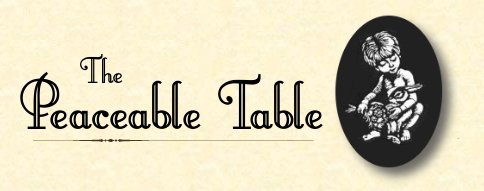
 In Narnia, 1300 years have passed, but only one year in England.
In Narnia, 1300 years have passed, but only one year in England.  During the summer of 1989, I was living in my fraternity house with a few other brothers who were also staying around the university for the summer. One particularly hot afternoon, two of us went to eat at the local cheese-steak house. Cheese-steak houses are particularly popular around the Philadelphia area and serve food which is about as grease laden and gooey as carnivores will eat. So, there we were talking over blood, grease, and anonymous cheese mush on a very hot afternoon on a summer where we had probably been up till four in the morning, drinking ourselves silly every night. We felt terrible and were not happy about it.
During the summer of 1989, I was living in my fraternity house with a few other brothers who were also staying around the university for the summer. One particularly hot afternoon, two of us went to eat at the local cheese-steak house. Cheese-steak houses are particularly popular around the Philadelphia area and serve food which is about as grease laden and gooey as carnivores will eat. So, there we were talking over blood, grease, and anonymous cheese mush on a very hot afternoon on a summer where we had probably been up till four in the morning, drinking ourselves silly every night. We felt terrible and were not happy about it. Behind the wild-bird's throat
Behind the wild-bird's throat In that wild orchid that your feet
In that wild orchid that your feet